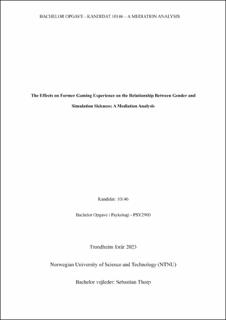| dc.contributor.advisor | Thorp, Sebastian | |
| dc.contributor.advisor | Lervik, Simon | |
| dc.contributor.author | Rasmussen, Ken | |
| dc.date.accessioned | 2023-07-14T17:19:54Z | |
| dc.date.available | 2023-07-14T17:19:54Z | |
| dc.date.issued | 2023 | |
| dc.identifier | no.ntnu:inspera:146342237:50622892 | |
| dc.identifier.uri | https://hdl.handle.net/11250/3079044 | |
| dc.description.abstract | Denne undersøgelse havde til formål at undersøge, om tidligere gaming-erfaring kunne forklare kønsforskelle i oplevelsen af simulationssyge i virtuelle miljøer (VR). VR-teknologi anvendes bredt i forskellige professioner, herunder psykologi, til behandling af mentale tilstande, men simulationssyge betragtes som en væsentlig ulempe. Tidligere forskning antyder, at kvinder måske er mere modtagelige for simulationssyge i VR-miljøer end mænd. Imidlertid viste resultaterne af denne undersøgelse, at tidligere gaming-erfaring ikke signifikant forudsagde sammenhængen mellem køn og simulationssyge. Ikke desto mindre havde kvinder markant mindre tidligere gaming-erfaring end mænd. Stikprøvestørrelsen var begrænset og i tråd med flere forskningsartiklers resultater, hvilket antyder, at forskere og udviklere bør fokusere på små detaljer, der bidrager til ubehag. Resultaterne fra denne undersøgelse kan inspirere yderligere undersøgelser for at tackle de ubehagelige konsekvenser af at bruge hovedmonterede displays (HMD) i VR-miljøer. Undersøgelsen konkluderer, at simulationssyge stadig er et fundamentalt problem, og forskere og udviklere bør fokusere på at løse problemet for at øge effektiviteten af VR-teknologi i forskellige professioner. | |
| dc.description.abstract | This study aimed to investigate whether previous gaming experience could explain gender differences in the experience of simulation sickness in virtual reality (VR) environments. VR technology is widely used in various professions, including psychology, to treat mental conditions, but motion sickness is considered a significant drawback. Previous research suggests that women may be more susceptible to simulation sickness in VR environments than men. However, this study's results indicated that previous gaming experience did not significantly predict the relationship between gender and simulation sickness. Nonetheless, women had significantly less previous gaming experience than men. The sample size was limited, consistent with several research articles' findings, suggesting that researchers and developers should focus on small details contributing to discomfort. The findings from this study may inspire further investigation to address the unpleasant consequences of using head-mounted displays (HMD) in VR environments. The study concludes that motion sickness remains a fundamental problem, and researchers and developers should focus on solving the issue to increase the effectiveness of VR technology across various professions. | |
| dc.language | dan | |
| dc.publisher | NTNU | |
| dc.title | The Effects on Former Gaming Experience on the Relationship Between Gender and Simulations Sickness: A Mediation Analysis | |
| dc.type | Bachelor thesis | |
